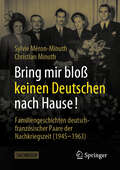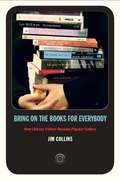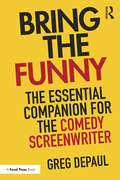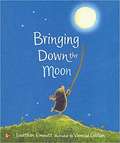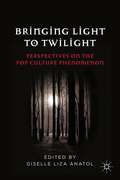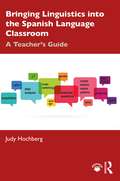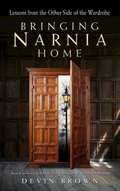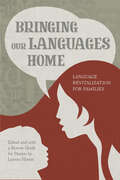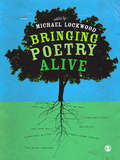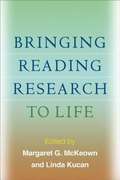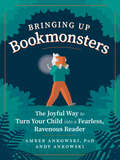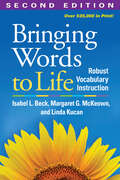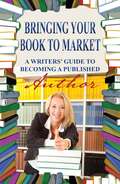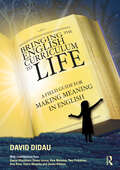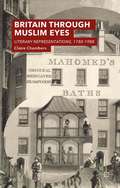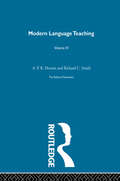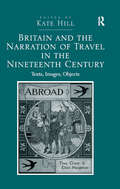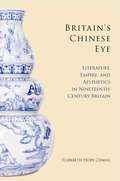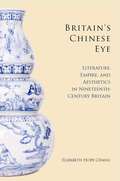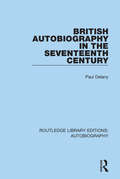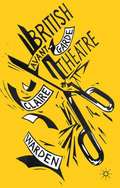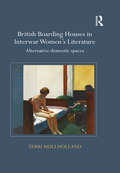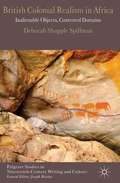- Table View
- List View
Bring mir bloß keinen Deutschen nach Hause!: Familiengeschichten deutsch-französischer Paare der Nachkriegszeit (1945-1963)
by Sylvie Méron-Minuth Christian MinuthDieses Buch erzählt faszinierende Geschichten von deutsch-französischen Familien in der Nachkriegszeit in einer spannenden historischen Studie. Es basiert auf Zeitzeugenberichten über eine Zeit, in der der Umgang mit einem Vertreter des Erbfeindes schwierig war und vielfach feindselig betrachtet wurde.
Bring on the Books for Everybody: How Literary Culture Became Popular Culture
by Jim CollinsBring on the Books for Everybody is an engaging assessment of the robust popular literary culture that has developed in the United States during the past two decades. Jim Collins describes how a once solitary and print-based experience has become an exuberantly social activity, enjoyed as much on the screen as on the page. Fueled by Oprah's Book Club, Miramax film adaptations, superstore bookshops, and new technologies such as the Kindle digital reader, literary fiction has been transformed into best-selling, high-concept entertainment. Collins highlights the infrastructural and cultural changes that have given rise to a flourishing reading public at a time when the future of the book has been called into question. Book reading, he claims, has not become obsolete; it has become integrated into popular visual media. Collins explores how digital technologies and the convergence of literary, visual, and consumer cultures have changed what counts as a "literary experience" in phenomena ranging from lush film adaptations such as The English Patient and Shakespeare in Love to the customer communities at Amazon. Central to Collins's analysis and, he argues, to contemporary literary culture, is the notion that refined taste is now easily acquired; it is just a matter of knowing where to access it and whose advice to trust. Using recent novels, he shows that the redefined literary landscape has affected not just how books are being read, but also what sort of novels are being written for these passionate readers. Collins connects literary bestsellers from The Jane Austen Book Club and Literacy and Longing in L. A. to Saturday and The Line of Beauty, highlighting their depictions of fictional worlds filled with avid readers and their equations of reading with cultivated consumer taste.
Bring the Funny: The Essential Companion for the Comedy Screenwriter
by Greg DePaulA sharp, funny book about comedy screenwriting from a successful screenwriter that uses recent – as in this century – movies you've actually seen as examples. Greg DePaul (Screenwriter, Bride Wars, Saving Silverman) has sold scripts to Miramax, Fox, Disney, New Line, Sony, MGM and Village Roadshow. He's worked with comedy stars like Jack Black, Kate Hudson, Jason Biggs and Amanda Peet. Now Greg takes everything he knows about writing comedy and breaking into the biz, tosses it into a blender and serves up this tasty, fat-free smoothie of a book that’s easy to read, brutally honest, and straight from the heart ... of Hollywood. Bring the Funny is chock full o' tricks, strategies and insider terms used by successful comedy screenwriters, including: Comic Justice Wrylies Genre-Bending Shadow Characters The BDR's The Two-Hander The Conceit Comedic Escalation Gapping A.I.C. Fish Outta Water The Idea Factory Really Important Comedy Screenwriting Rules Number 99 and 100 If you're looking to write funnier and better screenplays, you want this book. But if you're ready to pack up your car, drive out to L.A., and dive into a career as a comedy screenwriter, you need this book. Now. Buy it, jam it into your pocket, and hit the gas. Greg's got your back.
Bringing Down the Moon (Elementary Core Reading Ser.)
by Jonathan Emmett Vanessa CabbanNIMAC-sourced textbook <P><P>Mole is so taken with the beauty of the moon that he tries to get it from the sky, but eventually learns to appreciate it where it is.
Bringing Light to Twilight
by Giselle Liza AnatolThe essays in this collection use the interpretative lens to interrogate the meanings of Meyer's books, making a compelling case for the cultural relevance of Twilight and providing insights on how we can "read" popular culture to our best advantage.
Bringing Linguistics into the Spanish Language Classroom: A Teacher's Guide
by Judy HochbergBringing Linguistics into the Spanish Language Classroom is a practical, time-saving resource that allows teachers to easily integrate the most interesting and important findings of Hispanic linguistics into their Spanish language classes. Teachers will find classroom-ready explanations and PowerPoint slides for each topic covered, as well as instructions and materials for in-class activities and take-home projects that will engage students in this fresh take on the target language. Slide presentations for each chapter are available online at www.routledge.com/9780367111960. The book covers aspects of Spanish from the trilled r to the personal a, from Indo-European origins to modern dialects, and from children’s first words to adult speech errors. An innovative set of five linguistics-based essential questions organizes and contextualizes this wide range of material: How is Spanish different from other languages? How is Spanish similar to other languages? What are the roots of Spanish? How does Spanish vary? How do people learn and use Spanish? Fully customizable to teacher and student interest, proficiency level, and time available in class, this book is ideal for Spanish language teachers looking to incorporate valuable linguistic insights into their curricula, even if they lack prior knowledge of this field. It is an excellent resource for Hispanic linguistics courses as well.
Bringing Narnia Home: Lessons from the Other Side of the Wardrobe
by Devin BrownThe wisdom of C. S. Lewis comes in a form that is deeply moving as well as great fun and high adventure. Noted Lewis scholar and popular speaker Devin Brown reveals the lessons woven throughout this endearing text. Bringing Narnia Home presents Lewis’s timeless message for the Narnian in each of us. Imagine opening a book and finding chapters like these:Of Mice and Minotaurs: Actions We See as Small and Insignificant Can Be More Important than We Realize Despite What White Witches, Tisrocs, and Other Tyrants ThinkNarnia Would Not Be Narnia if It Was All Badgers: It Takes a Village (One with Giants, Dwarfs, and Everyone in Between) to Make a CommunityAdventures Can Begin in the Most Unlikely Places (Something to Keep in Mind the Next Time You Find Yourself in an Unlikely Place)A wise, winsome, and whimsical look at the important values and lessons the Narnia series teaches that actually provide the groundwork for a profound and meaningful life.
Bringing Our Languages Home: Language Revitalization for Families
by Leanne HintonThroughout the world individuals in the intimacy of their homes innovate, improvise, and struggle daily to pass on endangered languages to their children. Elaina Albers of Northern California holds a tape recorder up to her womb so her baby can hear old songs in Karuk. The Baldwin family of Montana put labels all over their house marked with the Miami words for common objects and activities, to keep the vocabulary present and fresh. In Massachusetts, at the birth of their first daughter, Jesse Little Doe Baird and her husband convince the obstetrician and nurses to remain silent so that the first words their baby hears in this world are Wampanoag. <P><P>Thirteen autobiographical accounts of language revitalization, ranging from Irish Gaelic to Mohawk, Kawaiisu to Māori, are brought together by Leanne Hinton, professor emerita of linguistics at UC Berkeley, who for decades has been leading efforts to preserve the rich linguistic heritage of the world. Those seeking to save their language will find unique instruction in these pages; everyone who admires the human spirit will find abundant inspiration.
Bringing Our Languages Home: Language Revitalization for Families
by Leanne HintonThirteen personal accounts of endangered language preservation, plus a how-to guide for parents looking to do the same in their own home.Throughout the world individuals in the intimacy of their homes innovate, improvise, and struggle daily to pass on endangered languages to their children. Elaina Albers of Northern California holds a tape recorder up to her womb so her baby can hear old songs in Karuk. The Baldwin family of Montana put labels all over their house marked with the Miami words for common objects and activities, to keep the vocabulary present and fresh. In Massachusetts, at the birth of their first daughter, Jesse Little Doe Baird and her husband convince the obstetrician and nurses to remain silent so that the first words their baby hears in this world are Wampanoag.Thirteen autobiographical accounts of language revitalization, ranging from Irish Gaelic to Mohawk, Kawaiisu to Maori, are brought together by Leanne Hinton, professor emerita of linguistics at UC Berkeley, who for decades has been leading efforts to preserve the rich linguistic heritage of the world. Those seeking to save their language will find unique instruction in these pages; everyone who admires the human spirit will find abundant inspiration.Languages featured: Anishinaabemowin, Hawaiian, Irish, Karuk, Kawaiisu, Kypriaka, Maori, Miami, Mohawk, Scottish Gaelic, Wampanoag, Warlpiri, Yuchi“Practical and down to earth, philosophical and spiritual, Bringing Our Languages Home describes the challenges and joys of learning and passing on your language. It gives good detailed advice . . . Fantastic! I hope millions will read it!” —Tove Skutnabb-Kangas, Åbo Akademi University, Finland, emerita“This rare collection by scholar-activist Leanne Hinton brings forward deeply affecting accounts of families determined to sustain their languages amidst a sea of dominant-language pressures. The stories could only be told by those who have experienced the joys and challenges such an undertaking demands. Drawing lessons from these accounts, Hinton leaves readers with a wealth of language planning strategies. This powerful volume will long serve as a seminal resource for families, scholars, and language planners around the world.” —Teresa L. McCarty, George F. Kneller Chair in Education and Anthropology, University of California, Los Angeles
Bringing Poetry Alive: A Guide to Classroom Practice
by Michael LockwoodOffering a wealth of ideas and support for ways to really bring poetry alive, this book draws on what is known to work, and explores fresh thinking. It will help both new and experienced teachers approach poetry with imagination and confidence. Written by people who have taught poetry in different settings for many years, and with contributions from poets Michael Rosen and James Carter, this book offers ideas on: - using drama - cross-curricular working - what to do with younger learners - inspiring children to write their own poems - and much more ... An enjoyable and uplifting book, it is a must for anyone working with children aged 5 to 14 who is looking for inspiration for their poetry teaching. Michael Lockwood is Senior Lecturer in English and Education, University of Reading.
Bringing Reading Research to Life
by Margaret Mckeown Linda KucanThis book brings together some of the world's foremost literacy scholars to discuss how research influences what teachers actually do in the classroom. Chapters describe the current state of knowledge about such key topics as decoding, vocabulary, comprehension, digital literacies, reading disabilities, and reading reform. At the same time, the authors offer a unique "inside view" of their own research careers key personal and professional influences, how their research agendas took shape, and what they see as the most important questions currently facing the field. The book honors the contributions of Isabel Beck, who has achieved tremendous success in translating research into widely used instructional practices.
Bringing Up Bookmonsters: The Joyful Way To Turn Your Child Into A Fearless, Ravenous Reader
by Andy Ankowski Amber AnkowskiThe no-stress, ferociously fun way to raise a kid who loves to read—complete with reading recommendations and activities to inspire! Teaching your child to read is monstrously important, and there’s no better way to do it than with everyday opportunities for laughter and play. Bringing Up Bookmonsters is full of fun ways to build literacy at home—no flashcards or timers required! Feed your budding bookmonster’s brain as you: Turn storytime into playtime to build comprehension. Get giggling with games and jokes that reinforce spelling. Converse at family meals with varied vocabulary. Satisfy your bookmonster’s cravings with books they are sure to devour! These tips and many more make it easy to help your child develop an insatiable appetite for reading—and have a tremendously good time doing it!
Bringing Words to Life, Second Edition: Robust Vocabulary Instruction
by Isabel L. Beck Margaret G. Mckeown Linda KucanHundreds of thousands of teachers have used this highly practical guide to help K-12 students enlarge their vocabulary and get involved in noticing, understanding, and using new words. Grounded in research, the book explains how to select words for instruction, introduce their meanings, and create engaging learning activities that promote both word knowledge and reading comprehension. The authors are trusted experts who draw on extensive experience in diverse classrooms and schools. Sample lessons and vignettes, children's literature suggestions, end-of-chapter summaries, and "Your Turn" learning activities enhance the book's utility as a classroom resource, professional development tool, or course text.New to This Edition*Reflects over a decade of advances in research-based vocabulary instruction.*Chapters on vocabulary and writing; assessment; and differentiating instruction for struggling readers and English language learners, including coverage of response to intervention (RTI).*Expanded discussions of content-area vocabulary and multiple-meaning words.*Many additional examples showing what robust instruction looks like in action.*Appendix with a useful menu of instructional activities.
Bringing Your Book to Market: A Writers' Guide to Becoming a Published Author
by Evan SwensenPublication Consultants specializes in publishing the works of writers worldwide. We've been in the publishing business since 1978. We're not only publishers, we're writers, and know many problems confronting writers. How to solve those problems and bring writer's work to market is our business. We welcome this opportunity to become acquainted with you and your work. Publication Consultants produces books and publications of any size, number of pages, and variety of binding and covers. We think there is more to book publishing than just putting ink on paper. Our services include design, typesetting, printing, binding, conversion, and all necessary steps to publish your book, both as a printed book and an. We take your book from conception to completion and bring your work to market with one of five different programs.
Bringing the English Curriculum to Life: A Field Guide for Making Meaning in English
by David DidauBringing the English Curriculum to Life builds on David Didau’s groundbreaking book Making Meaning in English by showing how the principles of the original book can be applied in schools and classrooms. Drawing together experiences of designing, teaching, supporting and assessing English across the schools within Ormiston Academies Trust (OAT), this book demonstrates what an ambitious, coherently sequenced, broad and balanced English curriculum with successful adaption for students with SEND can look like in practice.Designed around the explicit teaching of the powerful conceptual knowledge students need to master the discipline, the book offers a fully resourced English curriculum packed with teaching suggestions and examples of high-quality practice. Covering intent, implementation and assessment, and outlining in detail what is included in each module for KS3 and 4, the curriculum can be adopted in its entirety, but is also flexible enough for departments to take modules and slot them into their own curriculum.Providing an inspiring model for teaching English that enables all students to succeed, this is an essential resource for all English teachers and school leaders responsible for curriculum development.
Britain Through Muslim Eyes
by Claire ChambersWhat did Britain look like to the Muslims who visited and lived in the country in increasing numbers from the late eighteenth century onwards? This book is a literary history of representations of Muslims in Britain from the late eighteenth century to the eve of Salman Rushdie's publication of The Satanic Verses (1988).
Britain and Scandinavia: The Reform Movement (Logos Studies in Language and Linguistics)
by Richard C. Smith A. P. R. HowattThis volume forms part of a five volume set charting the progress of the nineteenth century movement, which was instrumental in establishing international guidelines for the teaching of modern languages. It was during this period that for the first time, co-operation between phoneticians and teachers culminated in the publication of works that were instrumental in establishing the 'applied linguistic' approach to language teaching in the twentieth century. For the first time, too, the new science of psychology influenced a scientific theory of second language acquisition. The Reform Movement attracted support across Europe, spurring the development of new professional associations and journals. In turn, the publication in these journals of reports of innovative practice contributed to a greater sense of autonomy and professionalism among modern language teachers, who had hitherto tended to live under the shadow of classical language teaching. The practical innovations and theoretical suggestions for the foreign language teaching, although rooted in the nineteenth century, still have relevance today.
Britain and the Narration of Travel in the Nineteenth Century: Texts, Images, Objects
by Kate HillInterrogating the multiple ways in which travel was narrated and mediated, by and in response to, nineteenth-century British travelers, this interdisciplinary collection examines to what extent these accounts drew on and developed existing tropes of travel. The three sections take up personal and intimate narratives that were not necessarily designed for public consumption, tales intended for a popular audience, and accounts that were more clearly linked with discourses and institutions of power, such as imperial processes of conquest and governance. Some narratives focus on the things the travelers carried, such as souvenirs from the battlefields of Britain’s imperial wars, while others show the complexity of Victorian dreams of the exotic. Still others offer a disapproving glimpse of Victorian mores through the eyes of indigenous peoples in contrast to the imperialist vision of British explorers. Swiss hotel registers, guest books, and guidebooks offer insights into the history of tourism, while new photographic technologies, the development of the telegraph system, and train travel transformed the visual, audial, and even the conjugal experience of travel. The contributors attend to issues of gender and ethnicity in essays on women travelers, South African travel narratives, and accounts of China during the Opium Wars, and analyze the influence of fictional travel narratives. Taken together, these essays show how these multiple narratives circulated, cross-fertilised, and reacted to one another to produce new narratives, new objects, and new modes of travel.
Britain's Chinese Eye
by Elizabeth Hope ChangThis book traces the intimate connections between Britain and China throughout the nineteenth century and argues for China's central impact on the British visual imagination. Chang brings together an unusual group of primary sources to investigate how nineteenth-century Britons looked at and represented Chinese people, places, and things, and how, in the process, ethnographic, geographic, and aesthetic representations of China shaped British writers' and artists' vision of their own lives and experiences. For many Britons, China was much more than a geographical location; it was also a way of seeing and being seen that could be either embraced as creative inspiration or rejected as contagious influence. In both cases, the idea of China's visual difference stood in negative contrast to Britain's evolving sense of the visual and literary real. To better grasp what Romantic and Victorian writers, artists, and architects were doing at home, we must also understand the foreign "objects" found in their midst and what they were looking at abroad.
Britain's Chinese Eye: Literature, Empire, and Aesthetics in Nineteenth-Century Britain
by Elizabeth Hope ChangThis book traces the intimate connections between Britain and China throughout the nineteenth century and argues for China's central impact on the British visual imagination.
Britain, France and the Gothic, 1764-1820
by Angela WrightIn describing his proto-Gothic fiction, The Castle of Otranto (1764), as a translation, Horace Walpole was deliberately playing on national anxieties concerning the importation of war, fashion and literature from France in the aftermath of the Seven Years' War. In the last decade of the eighteenth century, as Britain went to war again with France, this time in the wake of revolution, the continuing connections between Gothic literature and France through the realms of translation, adaptation and unacknowledged borrowing led to strong suspicions of Gothic literature taking on a subversive role in diminishing British patriotism. Angela Wright explores the development of Gothic literature in Britain in the context of the fraught relationship between Britain and France, offering fresh perspectives on the works of Walpole, Radcliffe, 'Monk' Lewis and their contemporaries.
British Autobiography in the Seventeenth Century (Routledge Library Editions: Autobiography #1)
by Paul DelanyOriginally published in 1969. In the seventeenth century neither the literary genre nor the term ‘autobiography’ existed but we see in seventeenth-century literature many kinds of autobiographical writings, to which their authors gave such titles as ‘Journal of the Life of Me, Confessions, etc. This work is a study of nearly two hundred of these, published and unpublished, which together represent a very varied group of writings. The book begins with an examination of the rise of autobiography as a genre during the Renaissance. It discusses seventeenth-century autobiographical writings under two main headings – ‘religious’, where the autobiographies are grouped according to the denomination of their writer, and ‘secular’, where a wide variety of writings is examined, including accounts of travel and of military and political life, as well as more personal accounts. Autobiographies by women are treated separately, and the author shows that they in general have a deeper revelation of sentiments and more subtle self-analyses than is found in comparable works by men. Sources and influences are recorded and also the essential historical details of each work. This book gives a critical analysis of the autobiographies as literary works and suggests relationships between them and the culture and society of their time. Review of the original publication: "…a contribution to cultural history which is of quite exceptional merit. Its subject is of great intrinsic interest and manifest importance and Professor Delany has treated it with exemplary thoroughness, lucidity, and intelligence." Lionel Trilling
British Avant-Garde Theatre
by Claire WardenThis book explores an under-researched body of work from the early decades of the twentieth century, connecting plays, performances and practitioners together in dynamic dialogues. Moving across national, generational and social borders, the book reads experiments in Britain during this period alongside theatrical innovations overseas.
British Boarding Houses in Interwar Women's Literature: Alternative domestic spaces
by Terri MullhollandEmbraced for the dramatic opportunities afforded by a house full of strangers, the British boarding house emerged as a setting for novels published during the interwar period by a diverse range of women writers from Stella Gibbons to Virginia Woolf. To use the single room in the boarding house or bedsit, Terri Mullholland argues, is to foreground a particular experience. While the single room represents the freedoms of independent living available to women in the early twentieth century, it also marks the precariousness of unmarried women’s lives. By placing their characters in this transient space, women writers could explore women's changing social roles and complex experiences – amateur prostitution, lesbian relationships, extra-marital affairs, and abortion – outside traditional domestic narrative concerns. Mullholland presents new readings of works by canonical and non-canonical writers, including Stella Gibbons, Winifred Holtby, Storm Jameson, Rosamond Lehmann, Dorothy Richardson, Jean Rhys, and Virginia Woolf. A hybrid of the modernist and realist domestic fiction written and read by women, the literature of the single room merges modernism's interest in interior psychological states with the realism of precisely documented exterior spaces, offering a new mode of engagement with the two forms of interiority.
British Colonial Realism in Africa
by Deborah Shapple SpillmanHow are objects central to the formation of individuals, their communities, and their liberties? What role do objects play as they move between societies and their different systems of value as commodities, as charms, as gifts, as trophies, or as curses? Nineteenth-century British authors attempting to transport narrative realism to the colonies confronted such questions directly and indirectly as they struggled to represent competing forms of material investment that characterized colonial and postcolonial life in Africa. Reading works by authors from Joseph Conrad and Mary Kingsley to Anna Howarth and Olive Schreiner against nineteenth-century African essays, folklore, visual arts, and recorded testimonies, this new study considers how conflicts over the material world impacted literary realism in colonial Africa. These conflicts highlight tensions between Victorian and African perceptions of objects and practices of exchange, while directing our attention toward alternate histories and stories yet to be told.
